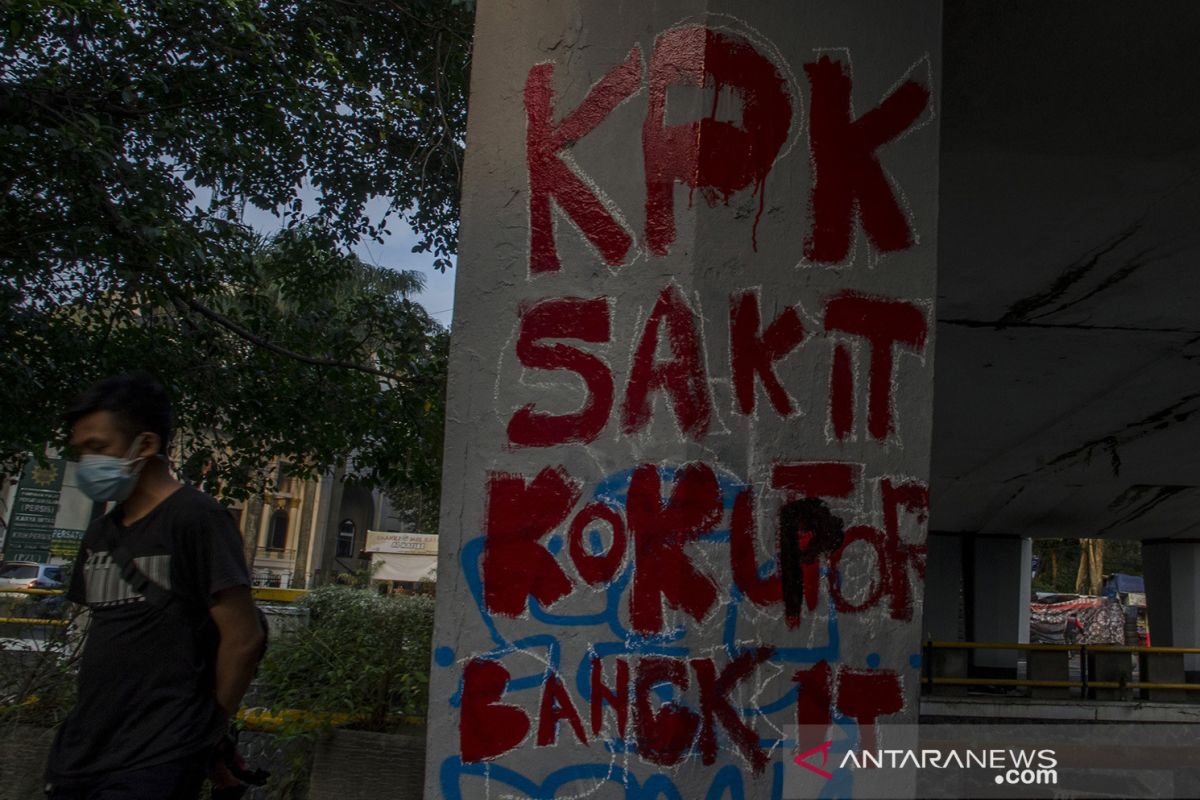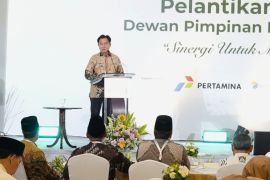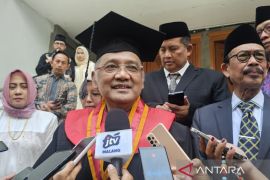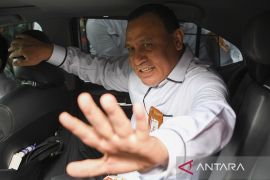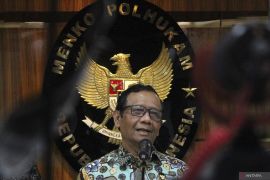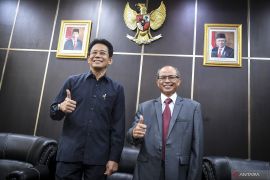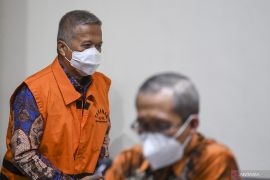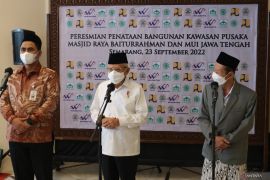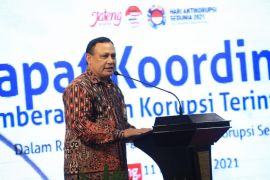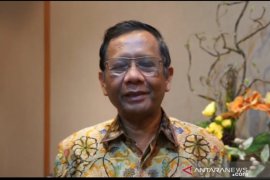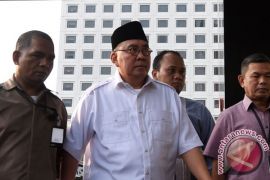Indonesia is not immune to the crime, as corruption cases committed by government officials, public figures, and ordinary people have been continuously exposed by law enforcers and reported by national media.
Non-governmental organization Indonesia Corruption Watch coordinator Adnan Topan Husodo stated that as a multidimensional issue, multi-perspective measures are a must to comprehend and address corruption issues.
Establishment of the Corruption Eradication Commission (KPK) in 2002 offered a new ray of hope in Indonesia’s anti-corruption crusade and set a novel phase in the Reform era that promised justice and firm action against corruption crimes.
The commission is the direct descendant of the State Apparatus Wealth Inspection Commission (KPKPN) earlier established, with a specific task of monitoring state apparatuses' wealth background.
Apart from the KPKPN, the government also established the short-lived Joint Team for Corruption Crime Eradication (TGPTPK) in 2000 that was disbanded after the Supreme Court ruled in favor of a judicial review request on the joint team’s legality.
The KPK has become the latest incarnation of anti-corruption commissions in Indonesia, as history had recorded past leaderships’ efforts in establishing anti-corruption bodies that achieved varied successes in their mission before its disbandment and replacement with new bodies.
History of anti-corruption commissions in Indonesia
Legal expert of Jakarta’s Bhayangkara University Amalia Syauket, in her monograph titled “History of Corruption Eradication Commitment in Indonesia” published in 2020, explained that past Indonesian governments had attempted to establish an anti-corruption commission in their efforts to eradicate corruption in Indonesia.
The first agency for anti-corruption mission in Indonesia was established as State Apparatus Retooling Committee (Paran) in 1957, headed by General A. H. Nasution, with the main duty of handling corruption cases. The committee suffered a setback, as government officials at that time resisted anti-corruption efforts made by the committee.
The State Apparatus Activities Monitoring Body (Bapekan) was then founded as Indonesia’s second anti-corruption commission in 1959 and was led by Hamengkubuwono IX. The body was mandated to observe, study, and propose monitoring of state apparatus activities to President Soekarno. It was disbanded in May 1962 amidst the body’s investigation of a public complaint reporting suspected corruption during the construction of a sports facility for the 1962 Asian Games.
After the disbandment of Bapekan, the government launched “Operasi Budhi” – initially organized under the Paran anti-corruption agency – in 1963 that aimed at investigating corruption-invested institutions and brought corruption cases to courts. The operation was commanded by General A. H. Nasution and successfully saved Rp11 billion of the state budget. The mission was short-lived, as the organization was disbanded three months after its establishment.
President Soekarno’s last attempt for the anti-corruption agency was the Highest Command for Revolution Apparatus Retooling (Kotrar) in 1964 under the direct command of the president and assisted by his foreign minister, Soebandrio. The presidential commission stagnated and dissolved as Soekarno’s government ended.
Assessing four anti-corruption commissions established during Soekarno's presidency, Syauket concluded that a frail legal basis -- the four commissions were established by mere presidential decrees -- was the main reason behind the anti-corruption commissions’ weaknesses during the period.
In her monograph, Syauket further elucidated anti-corruption institutions that were established by President Soeharto during his 32-year rule to continue anti-corruption efforts made by the previous government.
After Kotrar’s collapse, President Soeharto decreed the establishment of the Corruption Eradication Team (TPK) under the Attorney General Office in 1967. The team’s disappointing performance -- which could only target small corruption cases committed by minor actors -- resulted in the team’s disbandment.
The team was replaced by the Committee of Four, established in early 1970, with former Prime Minister Wilopo among the committee’s members. The committee was even more short-lived than the previous team, as the government suddenly disbanded the committee in July 1970.
After a long absence of an institution, with a specific purpose of eradicating corruption, President Soeharto launched “Operasi Tertib” in 1997 to monitor and reprimand illegal fees and budget manipulation in government offices. The public perception that the organization had failed to be transparent in its daily activities caused the operation to remain dimmed until the fall of the New Order.
As the New Order’s fall ushered the Reform era, several attempts were made to establish anti-corruption institutions. After the failure of TGTPK and the establishment of KPKPN, the KPK was established in 2002, and succeeding presidents continued to reiterate their commitment to supporting and assisting the KPK’s mission.
Addressing corruption issues in Indonesia
Despite the long-standing history of anti-corruption commissions in Indonesia and the consolidation of the current anti-corruption commission KPK, corruption cases remain rampant in the country. Hence, not surprisingly, some residents may question the effectiveness of anti-corruption agencies and the government’s commitment to anti-corruption efforts.
To this end, Husodo opined that the mushrooming corruption cases in Indonesia mostly occurred in the top leadership that dripped to the lower level, causing more corruption cases involving their subordinates and other sectors in the society.
He highlighted the need for an independent anti-corruption agency to address corruption cases and investigate corruption crimes committed by government officials and other figures.
Despite KPK’s presence having contributed to enhancing law enforcement and investigation of corruption cases in Indonesia, the activist believes that clear commitment of the government and active participation of members of the public were crucial for thorough anti-corruption efforts.
Concurring with Husodo, Syiah Kuala University’s public administration expert, Wais Alqarni, stated that corruption eradication efforts must have a multi-level approach that involves multiple sectors in the society.
The expert suggested maximizing anti-corruption education, enhancing internal government monitoring and audit, allowing public access to government financial data, as well as encouraging public participation in monitoring government activities and promoting anti-corruption messages.
Collaboration between the people and government will indubitably ease efforts to tackle challenges in eradicating the corruption outbreak in Indonesia.
Related news: Indonesia creating corruption-prevention database of aid recipients
Related news: KPK open to collaborate with IM57+ Institute
Related news: Law enforcers must uphold transparency while performing duties: Mahfud
Editor: Rahmad Nasution
Copyright © ANTARA 2021
